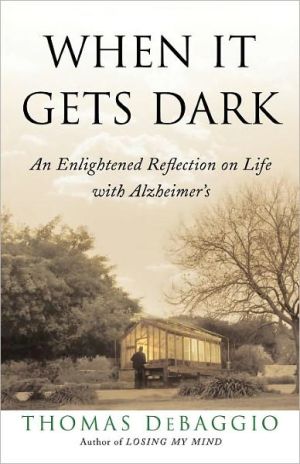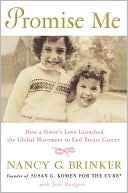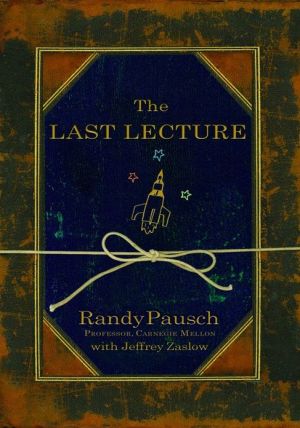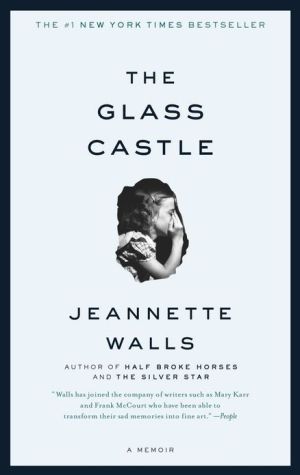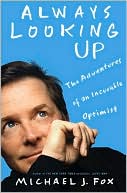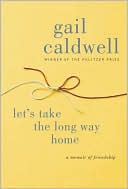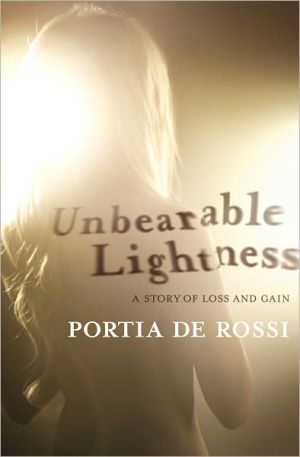When It Gets Dark: An Enlightened Reflection on Life with Alzheimer's
With his first memoir, Losing My Mind, Thomas DeBaggio stunned readers by laying bare his faltering mind in a haunting and beautiful meditation on the centrality of memory to human life, and on his loss of it to early-onset Alzheimer's disease. In this second extraordinary narrative, he confronts the ultimate loss: that of life. And as only DeBaggio could, he treats death as something to honor, to marvel at, to learn from.\ Charting the progression of his disease with breathtaking honesty,...
Search in google:
With his first memoir, Losing My Mind, Thomas DeBaggio stunned readers by laying bare his faltering mind in a haunting and beautiful meditation on the centrality of memory to human life, and on his loss of it to early-onset Alzheimer's disease. In this second extraordinary narrative, he confronts the ultimate loss: that of life. And as only DeBaggio could, he treats death as something to honor, to marvel at, to learn from.Charting the progression of his disease with breathtaking honesty, DeBaggio deftly describes the frustration, grief, and terror of grappling with his deteriorating intellectual faculties. Even more affecting, the prose itself masterfully represents the mental vicissitudes of his disease -- DeBaggio's fragments of memory, observation, and rumination surface and subside in the reader's experience much as they might in his own mind. His frank, lilting voice and abundant sense of wonder bind these fragments into a fluid and poetic portrait of life and loss.Over the course of the book, DeBaggio revisits many of the people, places, and events of his life, both in his memory and in fact. In a sense, he is saying goodbye, paying his respects to the world as it recedes from him -- and it is a poignant irony that even as this happens, he is at the height of his remarkable descriptive powers. In his moments of clarity, his love for life's details only grows deeper and richer: the limestone creek where he has fished for years; his satisfying and lonely herb farming days; the goldfish pond his son designed and built in his backyard in honor of DeBaggio's passion for "any hole in the ground with some liquid in it"; the thirty years in his beloved home in Arlington, Virginia; his early career as a muckraker; the innumerable precious moments spent with his wife and son; his belated grief over his parents' deaths.Adeptly navigating between elegy and celebration, fear and determination, confusion and clarity, DeBaggio delivers an exquisitely moving and inspiring book that will resonate with all those who have grappled with their own or their loved ones' memory loss and with death. Publishers Weekly DeBaggio's second memoir expands on his first, 2002's Losing My Mind. He turns away from the immediacies of Alzheimer's diagnosis and treatment and toward the past that his illness is gradually obscuring. During the late 1960s and early '70s, DeBaggio struggled as an underpaid reporter, new husband and father in Arlington, Va. Only when he launched a career as a commercial herb grower, working in greenhouses he built in his own suburban backyard, did he find success. An Alzheimer's diagnosis came at the unusually early age of 57. These specifics are rather deeply imbedded in a book composed primarily of simple, moment-to-moment observations, with gentle, cumulative strength and little drama. DeBaggio gives tension to his narrative by shifting back and forth between his past and present, with changes in tense and typography acting as signposts. But things get complicated when he weaves in numerous bits of other prose and poetry, including personal and professional correspondence, his own odd and sudden thoughts (e.g., "This is a county fair of the mind") and quotes from the likes of Beckett, Breton and William Carlos Williams. The book is at its best in describing the particulars of DeBaggio's career as an herb grower: shooing suburban raccoons, teaching orphaned baby robins to feed and fly, ignoring neighbors' skeptical attitudes. The horticultural writing, understated and often poetic, rivals that of Michael Pollard and Jamaica Kincaid and will reward patient readers. (Nov. 12) Copyright 2003 Reed Business Information.
When It Gets Dark\ An Enlightened Reflection on Life with Alzheimer's \ \ By Thomas DeBaggio \ Free Press\ Copyright © 2003 Thomas DeBaggio\ All right reserved.\ ISBN: 0-743-25003-6 \ \ \ \ Chapter One\ Only he who maintains the existence of death present before him proceeds in truth, the others act always with a mental reservation, are afraid of death, and so do not think about it, as though it were not there. - Ferdinando Camon, Un altare per la madre \ It is not simply beets and potatoes and corn and string beans that one raises in his well-hoed garden, it is the average of human life. There is life in the ground; it goes into the seeds; and it also, when it is stirred up, goes into the man who stirs it." - Charles Dudley Warner, My Summer in a Garden, 1874\ Much of what we believe is mythical, a way to blur reality to make it easier to understand the past and how it connects with the present. We live on memories, whether it is a memory of how to replace a lightbulb or drive a car, or the recollection of our parents, lovers and children. The sum of our memories guide, befriend or leave us shivering with fear.\ Memories, no matter how trivial, remind us of events and sorrows. They become a touchstone of who we were and who we want to be. The best we can do is rely on memory, acknowledging that not all of it is remembered well and faithfully.\ You and I, we're both running against death, even when we can't touch it, or see its ugly face.\ Cars swish beside me as I walk. The nervous titter of angry horns on speeding cars rushes by me. Pigeons gather on a single apartment roof at the same time each day awaiting my passage along the street.\ The apartment was silent until the telephone splintered my solitude. I went to the kitchen and picked up the receiver.\ Do you know where your wife is? an unfamiliar voice began.\ Yes, I said. Who is this?\ Right about now, the voice continued, she is in the arms of a big, nigger football player at the University of Delaware and she is panting as he sticks his big, black cock into her.\ I hung up, exploding with fear and anger.\ The telephone call was the first in a series I received. They often came when Joyce attended night meetings of the Wilmington Bail Committee, a community group established to help young black activists get out of jail on bond. It was the first time such a call truly frightened me.\ I did not believe the words of the man on the telephone. What frightened me was someone in the dark watching, trying to disrupt our lives, maybe even tap our telephone. We were sure the phone calls came either from members of the Wilmington Police Department, members of the Delaware National Guard, or a special unit of the U.S. government on assignment after the city exploded with pent-up rage the day of Martin Luther King's assassination. Those who inhabited Wilmington during that time told stories of dark fear and trembling rage.\ What brought me from the Midwest back to the East Coast and Wilmington was a job with a local daily newspaper, the News Journal. It was here that my journalism dreams died. I stayed long enough at the newspaper to share a reporting award. We should have left town after those first six months at the newspaper, but the friends we made held us, at least for a while, and long enough for Francesco to complete first grade.\ In Wilmington I encountered existential emptiness and for the first time I questioned the belief that America was the land of the free. For some, especially for African-Americans, it was an awkward, fearful hell if you dared challenge the status quo. When you are young, as we were then, you can see these things with frightful clarity.\ Wilmington was an angry, segregated place, with African-Americans and whites living in separate and very unequal conditions. Fortunately, there were still those who believed in the promise freedom held for all. I remember a woman living outside Wilmington, who left her front door unlocked to give those on the run a place to eat and sleep, the way African-Americans fled the slave masters of years ago. From what she told me, it seemed the old underground railroad was alive and well, with a crowded stop at her home. There were few others with the same reckless spirit.\ These were tough, outrageous times and it brought out the best of some people in Wilmington. It was a rare chance to rip back layers of fear and watch dedicated individuals work to release those in quiet bondage. Also during this time, I watched with tearful eyes what could have been the best and brightest of Wilmington succumb to the deadly evils of heroin, surely one of the "dirtiest" ways to silently disarm an angry young population of black men and women.\ Tears tumble uncontrolled across my cheeks as I sit in the living room chair. What calls the tears to lubricate my cheeks? Where is the secret pain that causes this outpouring of sorrow?\ Joyce and I, and a bewildered six-year-old Francesco, gathered our belongings and ran from the fears of Delaware like peasants fleeing a plague. We left behind some of the best friends we ever had, but we could not handle the political pressures and the frightening calls in the middle of the night. It was a place in which strong currents pushed us to be people we were not. We were not skilled in this kind of combat.\ We returned to Virginia, the one place we knew best, with tears in our eyes. It was home for both of us, the place where Joyce and I grew up in our own separate and peculiar ways. Even if we weren't at home, it was a place we understood. Here we licked our wounds and bemoaned the loss of so many good friends left behind. The spirit of our friends in Delaware was not far away and we could make short forays across the border to be with them.\ We shacked up in a dreary huddle of brick, two-story attached houses on the underskirts of well-off Alexandria, Virginia. Our back side was against a large shopping center. Through our back window and the broken wooden fence, we saw men and women heft themselves into a green dumpster in search of their daily sustenance. They sifted carefully through the out-of-date food the Giant grocery tossed away every day. The smell from the container was sometimes rich with rotting food, and bees and flies worked their way through the soft, rotting remains.\ There are days full of static when little memory remains, and I wander over the hidden landscape like a child trying to catch slippery raindrops. The interior cacophony I carry within me is full of broken sentences, and tears.\ There are other days when memory is so thick and beautiful I can't see the world for all the happy congestion.\ So this is the way my world ends, fighting shadows, wrapped in fear, trembling to remember who I am and where I am headed.\ Despite the poverty of words, and a memory chewed by Alzheimer's, I intend to open my inner life and at the same time reflect on everyday simple things, as death's shadow falls across my dwindling days. This is not a book of kings and queens but of ordinary people struggling in the world they inhabit. It is my world, and the world of my wife, Joyce, and son, Francesco.\ This is not a book crafted with care and threaded with hope. It is a book of anger and tears, expressed in a cage of waiting death ruled by Alzheimer's, a disease without survivors.\ I became a creature of the tension between a life of the moment and the languid, rotting fruit of memory upon which I rely for life.\ This is not a book barren of trees, birds and ordinary sweat.\ In the end, this book is about becoming silent, while all around cars honk impatiently.\ Our move from Delaware was made possible by Ted Rowse, a publisher of consumer affairs newsletters in Washington, D.C. I met him at a convergence of muckrakers and we shared stories. I was unaware he was sizing me up for a job on a newsletter to be called Consumer Newsweek.\ When Ted's call came offering me a job, we lacked the money to move and he paid our expenses. I went to work right away in a little two-room office in the National Press Building in the heart of Washington, D.C., two blocks from the White House. Consumer consciousness was raised daily during the early 1970s by Ralph Nader. He was the shining light of the time, building a muckraking empire to right wrongs. There was an aura of hope, and change was in the air.\ From the first day on Rowse's payroll, life became wondrous. What a job it was for a young journalist. It required covering Congress and dashing around town in cabs to attend press conferences held in gray government offices.\ Rowse's office was on the seventh floor and I looked down on the street and saw throbbing movement everywhere. Computers were not even in our dreams and big manual typewriters were what we used to produce the newsletters. It was the first job in which I felt secure and happy.\ It never occurred to me we had to find subscribers to support my journalism. It was a lesson I learned quickly. The grant money Ted used to hire me ran out long before the newsletter found a following. I loved the job so much I worked for nothing for several months after Ted told me he could no longer pay me.\ I was able to stay on for a few more months because Joyce found a job with a shop-at-home company making custom slipcovers and window treatments. She went out to homes and helped the owners choose the coverings and fabrics. She was able to set her own schedule and worked around Francesco's school hours.\ I hoped for a miracle but it didn't come. After a short 10-month stay, I was suddenly a flash in the pan and out of journalism again.\ At night my days are stolen, leaving me weeping for even a glimmer of yesterday.\ Now, nearly thirty years after we fled Wilmington, my body, burdened by time, has begun to disintegrate in subtle and angry ways, as my brain slowly turns into Alzheimer's mush. I find myself in yet another battle, this time from a combatant I cannot see.\ Like old window glass, buffeted by slashing rain, blurred images fill the sorrowful world of my days. At night, when I shut my eyes to sleep, I am sometimes bombarded with hallucinations. They appear first as flashing lights of many colors, sometimes greens, and blues predominate. A few moments later white klieg lights spin brightly to the surprise of my shut eyes. In these uncontrollable moments, hallucinations overtake my brain. If it were real, my eyes would burn from the heat. In these private moments I see things all around me, unseen by everybody else. Sometimes the hallucinations are so weak they turn into still photographs in which individuals, stiff from invincible time, pose for the camera as in times past.\ It is hard to make sense of the world under these conditions. If I viewed the world through blurred images of old window glass, I might believe I inhabit a universe of fearful, angry currents.\ My world today has all the strangeness of the flowing images of an underwater world. Sometimes I try to read a sentence but several of the words appear unfamiliar. If I stare at the word long enough, I am usually able to understand its meaning.\ Six months ago my reading comprehension was quite ordinary. That was before my vocabulary began to totter and slip into the oil tank of perdition. Many more waves of destruction are yet to come, ending in a humiliating ball of frightful, childlike confusion.\ Small insults occur every day, most of them centered on loss of vocabulary, but I have trouble understanding television as well. I am creeping on two legs toward a world of crawling and diapers.\ A robin dances lightly along the overhead power line. With a nimble bounce it dives into the dense, green-leaved bay tree covering the side of the house where a nest hides.\ When we returned to Virginia, the place we called home, we put Francesco in public school. He did well in first grade in Delaware but before long we discovered he was doing poorly. Francesco said he didn't understand what was going on. I fired off a letter to his second grade teacher. He came from an open classroom situation and the teacher thought Francesco understood how things worked. Unfortunately, the two open classrooms were different. Once he understood the new system, his grades improved.\ Before long Christmas brought new hurdles. We told Francesco early in his life Santa Claus was make-believe but now he was confused; his teacher talked about Santa Claus as if he were real. I sent a second letter to his teacher, urging her to tell the truth about Santa.\ Later, Joyce and I talked with the teacher but she offered no solution. Life was against our desire to be truth tellers. Francesco's teacher must have thought me a madman-dreamer, an out-of-control Don Quixote. She was probably right.\ As Francesco grew older, his fascination with Christmas trees sharpened. I tried to divert him by decorating dead tree branches one year. Finally I gave in and bought an artificial tree on sale. It didn't assuage Francesco's need for a real tree that dropped needles and made a mess.\ I was never able to weaken Francesco's love of Christmas. He celebrates now with the biggest tree his house will hold, but he doesn't stay up late on Christmas Eve waiting for Santa. Joyce and I still have the plastic tree but it stays in the basement unused.\ An epiphany of wonder brings a raw, grisly, blunt shout from my anxious throat, the loud, rough honking of Alzheimer's, revealing a sudden hidden emotion compounded by fear, and weakening mortality.\ After I quit writing consumer journalism, I wrote pieces again for the Delaware Spectator. I helped Ralph Morris start the paper when we lived in Wilmington and I kept in touch with him by phone and on occasional visits. I took the train to and from Wilmington. Tuesdays I took a seven A.M. train from Union Station in Washington to Wilmington. I returned Thursday night.\ I bunked next door to Ralph in his brother's house on West 10th Street. I never saw much of brother Joe, a schoolteacher, but the front door was always unlocked and I was glad to have the use of his spare bedroom. Dorina, Ralph's wife, always had supper waiting for us but she never knew when we'd show up at night.\ Ralph tried to pay me regularly but the paper was not making money. I received several checks for $100, but the newspaper was draining Ralph financially and physically. When Ralph paid me he always reminded me how shaky the newspaper's financial footing was. Be sure to cash the check before you leave Wilmington, he always cautioned.\ \ Continues...\ \ \ \ Excerpted from When It Gets Dark by Thomas DeBaggio Copyright © 2003 by Thomas DeBaggio. Excerpted by permission.\ All rights reserved. No part of this excerpt may be reproduced or reprinted without permission in writing from the publisher.\ Excerpts are provided by Dial-A-Book Inc. solely for the personal use of visitors to this web site. \ \
\ Publishers WeeklyDeBaggio's second memoir expands on his first, 2002's Losing My Mind. He turns away from the immediacies of Alzheimer's diagnosis and treatment and toward the past that his illness is gradually obscuring. During the late 1960s and early '70s, DeBaggio struggled as an underpaid reporter, new husband and father in Arlington, Va. Only when he launched a career as a commercial herb grower, working in greenhouses he built in his own suburban backyard, did he find success. An Alzheimer's diagnosis came at the unusually early age of 57. These specifics are rather deeply imbedded in a book composed primarily of simple, moment-to-moment observations, with gentle, cumulative strength and little drama. DeBaggio gives tension to his narrative by shifting back and forth between his past and present, with changes in tense and typography acting as signposts. But things get complicated when he weaves in numerous bits of other prose and poetry, including personal and professional correspondence, his own odd and sudden thoughts (e.g., "This is a county fair of the mind") and quotes from the likes of Beckett, Breton and William Carlos Williams. The book is at its best in describing the particulars of DeBaggio's career as an herb grower: shooing suburban raccoons, teaching orphaned baby robins to feed and fly, ignoring neighbors' skeptical attitudes. The horticultural writing, understated and often poetic, rivals that of Michael Pollard and Jamaica Kincaid and will reward patient readers. (Nov. 12) Copyright 2003 Reed Business Information.\ \ \ \ \ Library JournalAt age 57, DeBaggio was diagnosed with early-onset Alzheimer's. Formerly a journalist and professional gardener, he recorded the course of his illness and its effects on his life in his remarkable 2002 memoir, Losing My Mind: An Intimate Look at Life with Alzheimer's. Here he continues his account of his struggle with the disease that causes "memories to leak through holes in my brain," gradually stealing his ability to write and, ultimately, his sense of self. Unlike his first book, which included scientific information about memory loss, this is a more personal work as DeBaggio writes "from the world of memory I've discovered inside my brain." He recounts stories of people and events from his past interspersed with observations on his failing abilities to handle everyday activities. He also describes how "[his] life creaks toward childhood" and expresses the fear and wonder his memory loss has brought him. Readers not familiar with the first book, which included introductory material that explained DeBaggio's diagnosis and why he decided to chronicle his life with Alzheimer's, may find this work less accessible. Nonetheless, both books offer a unique addition to the genre of personal writings on memory loss. Copyright 2003 Reed Business Information.\ \ \ Kirkus ReviewsA sequel to Losing My Mind (2002) continues the author’s poignant account of living with a disease that destroys memory and, with it, life’s meaning. DeBaggio, a former journalist and herb-grower, weaves together his recollections of his past life, his observations about the present, and his fears for the future. The larger part of the present work recounts his efforts to start a small garden business. In his backyard stands an empty greenhouse that is now both his repository of memories and his personal memorial. With his long-term memory battered but still intact, he recounts how it came to be there and why it’s now empty. DeBaggio’s picture of the changing face of Arlington, Virginia, where he has lived for decades, and especially of his neighborhood and his street, is fresh and clear. Along the way there are short, almost haiku-like fragments revealing his internal world ("A shadow as thin as a slice of tomorrow follows me around. It is the memory of yesterday") and his observations of the external ("A woman with smoky skin huddles against the cold wind as the sun comes up on a Tuesday morning"). Sad excerpts from his letters and bleak quotes from Henry Miller, Samuel Beckett, Kenneth Patchen, et al., dot the text, all without comment and needing none. By the end, his competencies are failing, his fear level has ratcheted up—but so has his acceptance level, and thoughts of death are frequent. DeBaggio makes agonizingly clear that experiencing the loss of one’s mind is painful and frightening. A sharp awakening to all those who imagine that Alzheimer’s sufferers remain blissfully unaware of what’s happening to them. Agent: Jonathon Lazear/Jonathon Lazear Agency\ \
